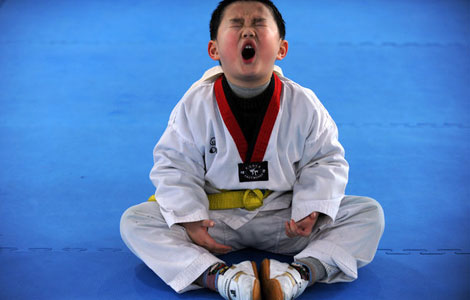Closer trade relations between mainland and HK benefit both
Updated: 2012-01-19 09:22
By Li Jiabao (China Daily)
|
|||||||||
|
An employee at FAW Group Corp's factory in Johannesburg, South Africa. The Ministry of Commerce says it encourages Hong Kong and mainland businesses to go abroad to enter international markets, especially markets in developing countries and regions. [Photo / Xinhua] |
BEIJING - Closer trade relations with the mainland can mitigate the harm posed by the global economic slowdown to Hong Kong's highly open economy.
The downturn and slowing of trade "will surely affect the economic growth of Hong Kong, a relatively open economy that relies greatly on overseas demand," said Shen Danyang, spokesman for the Ministry of Commerce, at a news conference on Wednesday.
He said the best way to respond to the situation is to strengthen trade cooperation between Hong Kong and the mainland.
"The ministry encourages businesses from Hong Kong and the mainland to go abroad to enter international markets, especially markets in developing countries and regions," Shen said.
Hong Kong "can take full advantage of the free trade in goods with the mainland and sell more products to the domestic market, which will partly compensate for exporting fewer goods to other destinations", he said.
In November, the value of Hong Kong's exports declined 3.6 percent year-on-year, and its exports to the US dropped by 18.3 percent from a year before, according to statistics released by Hong Kong's Census and Statistics Department on Tuesday.
Jiang Yaoping, vice-minister of commerce, said on Tuesday that promoting trade cooperation is a key part of 36 policies announced by Vice-Premier Li Keqiang during his visit to Hong Kong in August.
"Hong Kong has become an important avenue for mainland businesses that want to go abroad to tap international markets," Jiang said. "It has advantages in financing, trade, law, accounting and investment consulting and the prospects for exploring international markets together look very promising."
Wang Haifeng, director of the International Cooperation Center affiliated with the National Development and Reform Commission, said "the essential thing is to combine the mainland's advantages in manufacturing and Hong Kong's superiority in the services industry to develop comprehensive competitive strength, so that businesses will be able to move into international markets and build up their brands as well as sales networks."
Wang said mainland businesses should set up branches in Hong Kong before they explore international markets, as many countries have tightened the requirements they impose on foreign investment during the current slowdown.
In 2011, China's outbound direct investment increased by 1.8 percent from a year earlier to reach $60.07 billion, according to the ministry.
In addition to the sluggish economy leading to reduced investments, "some countries have placed limits on foreign investors, especially foreign State-owned enterprises, which pose risks to Chinese enterprises that are looking into international markets", Shen said,
Even so, Shen said the mainland's import demands "will surely expand during the 12th Five-Year Plan (2011-15). And the (Hong Kong) special administrative region can promote the sale of goods produced in Hong Kong - as well as processed goods imported from other regions - to the mainland market".
The value of retail sales on the mainland will increase by 15 percent annually during the 12th Five-Year Plan and reach 32 trillion yuan in 2015, according to the ministry.
Related Stories
Hong Kong-Mainland to boost IT collaboration 2011-04-12 16:48
Hong Kong to foster economic diversification 2011-02-23 15:48
Hong Kong economy needs diversity 2011-06-10 08:03
HK's financial services industry grows 2011-12-01 10:05
- Closer trade relations benefit both
- China's non-financial ODI totals $60.07b
- FDI registers another drop in Dec
- Profits of China's State firms grow 12.8%
- Chinese banks short of cash ahead of holiday
- Property prices drop in more cities in Dec
- China's social financing shrinks in 2011
- Disney brings famous character brands to China









